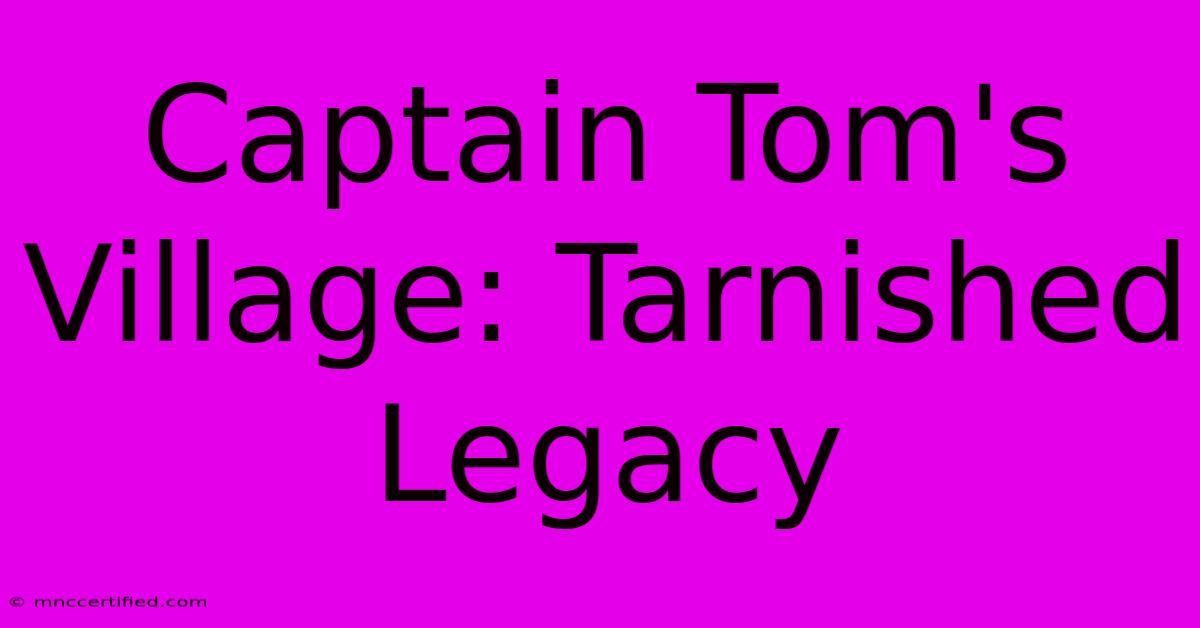Captain Tom's Village: Tarnished Legacy

Table of Contents
Captain Tom's Village: A Tarnished Legacy?
Captain Sir Tom Moore, a national hero who captivated the hearts of millions during the COVID-19 pandemic, left behind a legacy far more complex than his fundraising efforts might suggest. While his charitable walk raised an astonishing amount of money for the NHS, the subsequent controversies surrounding his family and the management of the Captain Tom Foundation have cast a shadow over his inspiring story. This article explores the complexities of his legacy, examining both the incredible positive impact and the less celebrated, more problematic aspects that have emerged since his passing.
The Phenomenon of Captain Tom
Captain Tom's story was undeniably inspirational. His 100th birthday walk, raising over £32 million for the NHS, became a symbol of hope and resilience during a time of national crisis. His unwavering spirit and determination resonated with people across the UK and the world, making him a global icon. This surge of national pride and collective fundraising effort was unprecedented, cementing his place in British history. The sheer scale of his fundraising success, achieved through simple acts of kindness and determination, cemented his status as a modern-day hero.
The Cracks in the Foundation: Financial and Governance Issues
Unfortunately, the subsequent investigations into the Captain Tom Foundation revealed significant concerns regarding its governance and financial management. News reports highlighted issues relating to:
- Fundraising practices: Questions arose about the efficiency and transparency of fundraising activities, with concerns raised about the proportion of donations reaching the intended beneficiaries.
- Financial irregularities: Allegations of potential misuse of funds and conflicts of interest involving family members involved in the Foundation's operations were investigated.
- Governance shortcomings: Criticism was directed towards the Foundation's governance structure, with concerns about a lack of transparency and independent oversight.
These revelations significantly impacted the public perception of Captain Tom's legacy. The initial outpouring of admiration and respect was tempered by disappointment and anger, as the shine of the inspiring story began to fade. The investigations, though not directly implicating Captain Tom himself, undeniably tarnished the image of the foundation set up in his name.
The Impact on Public Trust and Charity Regulation
The controversies surrounding the Captain Tom Foundation have had a broader impact beyond just the organization itself. They have raised important questions about:
- Charity accountability: The case highlighted the need for greater transparency and accountability within charities, particularly those receiving significant public donations. This has led to renewed calls for stricter regulations and enhanced oversight mechanisms.
- Public trust: The events damaged public trust not only in the specific charity but also in charitable organizations more broadly. This erosion of trust makes fundraising more challenging for other worthy causes.
Reassessing the Legacy: Separating the Man from the Institution
It's crucial to differentiate between Captain Tom's personal actions and the subsequent failures of the organization bearing his name. While the controversies surrounding the foundation are undeniably serious, they should not diminish the profound impact of his individual acts of kindness and the inspiration he provided during a difficult period. His legacy remains complex, a bittersweet mixture of extraordinary achievement and significant disappointment. This complexity underscores the need for robust charity governance and transparency to protect the integrity of charitable endeavors and maintain public trust.
The Future of Charitable Giving: Lessons Learned
The Captain Tom Foundation saga provides crucial lessons for the future of charitable giving. It highlights the critical importance of:
- Due diligence: Donors should conduct thorough research before contributing to any charity.
- Transparency and accountability: Charities must prioritize transparency in their operations and financial reporting.
- Strong governance structures: Effective governance structures are essential to ensuring the responsible management of charitable funds.
The story of Captain Tom's Village and its subsequent struggles serves as a cautionary tale, reminding us of the importance of carefully safeguarding the legacies of inspirational figures and ensuring that charitable organizations operate with the highest levels of integrity. The focus should now shift towards implementing reforms that prevent similar situations from occurring in the future, thereby safeguarding public trust in charitable giving.

Thank you for visiting our website wich cover about Captain Tom's Village: Tarnished Legacy. We hope the information provided has been useful to you. Feel free to contact us if you have any questions or need further assistance. See you next time and dont miss to bookmark.
Featured Posts
-
Pet Insurance Jobs For Vet Techs
Nov 22, 2024
-
Supreme Court Reverses Jussie Smolletts Conviction
Nov 22, 2024
-
Captive Insurance Cayman Islands
Nov 22, 2024
-
Snowflake Surges Revenue And Profit Top Expectations
Nov 22, 2024
-
Pratt On Bengals Steelers A Win
Nov 22, 2024